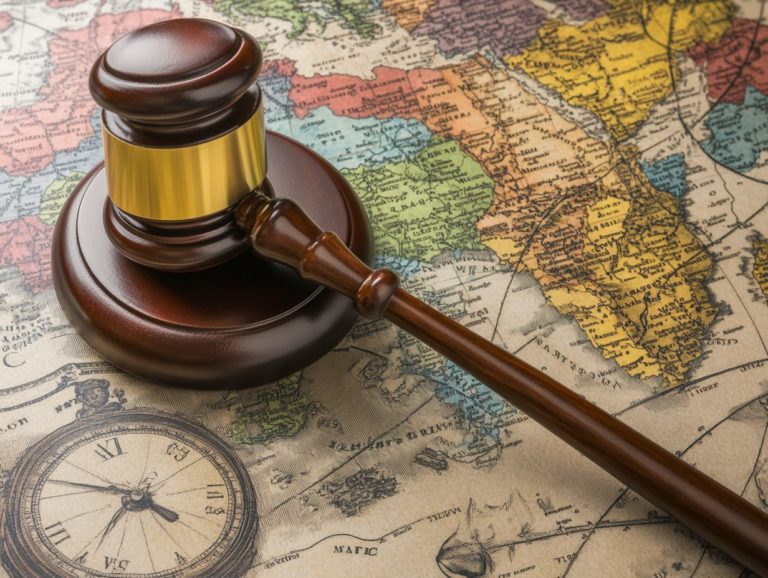The Role of Data in IP Litigation Decisions
Intellectual property (IP) litigation is complex. Data plays a key role in shaping outcomes.
This article explores different types of data used in IP cases. It provides examples and sources that impact decision-making.
You ll learn how data improves strategic planning. It also highlights the challenges and risks involved.
Best practices for data management and analysis will be outlined. This will help you navigate this complex landscape confidently.
Contents
- Key Takeaways:
- Types of Data Used in IP Litigation
- Benefits of Using Data in IP Litigation Decisions
- Potential Challenges in Utilizing Data in IP Litigation
- Best Practices for Incorporating Data in IP Litigation
- Preguntas Frecuentes
- Cu l es el papel de los datos en las decisiones de litigio de PI?
- Qu tipos de datos se utilizan com nmente en el litigio de PI?
- C mo puede el an lisis de datos ayudar en las decisiones de litigio de PI?
- Cu les son los beneficios de utilizar datos en decisiones de litigio de PI?
- C mo se pueden recopilar y analizar los datos en el litigio de PI?
- Qu precauciones se deben tomar al utilizar datos en decisiones de litigio de PI?
Key Takeaways:

Data is crucial for smart decision-making in IP litigation. While it brings great opportunities, be aware of the risks involved. Mastering data management and analysis techniques is essential for success.
Overview of Intellectual Property Litigation
Intellectual Property Litigation encompasses a broad spectrum of legal disputes related to intellectual property rights, including patents, copyrights, and trademarks. Each of these areas presents its own distinct challenges and opportunities for innovation.
As the IP landscape evolves, you ll find that data-driven insights and analytics have become essential, especially for legal teams navigating the complexities of cases involving non-practicing entity (NPE) plaintiffs, litigation finance, and patent portfolios.
The integration of AI in patent litigation further elevates this process, providing tools to analyze historical data and refine settlement strategies.
This intricate arena demands not only a thorough understanding of legal principles but also a keen awareness of technological advancements that can shape your case strategies.
For example, patent disputes frequently involve detailed evaluations of validity and infringement, where NPE plaintiffs may exploit loopholes to assert their claims.
Today s litigation increasingly relies on predictive legal analytics, which can forecast outcomes based on previous case precedents. This arms you with actionable intelligence.
These innovations enable you to craft proactive strategies, optimize resource allocation, and improve overall efficiency in resolving IP conflicts.
Types of Data Used in IP Litigation
In intellectual property litigation, you will encounter a range of data types essential for substantiating claims and defenses. This includes research data retention, ownership of data, and metadata that describes the content under scrutiny, as highlighted in the role of technology in modern IP litigation.
Mastering effective data management and data-sharing practices becomes critical for legal teams like yours. This enables you to extract valuable insights from these data sources while maintaining compliance with copyright protections and database rights.
Examples and Sources of Data
In intellectual property litigation, you’ll encounter a wealth of data sources, including prior art documentation, legal obligations tied to copyright, and understanding the role of the court in IP litigation, along with database content from various repositories.
By leveraging resources like Creative Commons and Open Data Commons, you can enrich your access to legal data, allowing for more comprehensive analysis during litigation.
For example, prior art consists of technical documents, patents, and scholarly articles that serve as crucial evidence of existing inventions and creative works. This significantly informs evaluations of originality.
Public domain resources such as government publications and expired patents offer invaluable insights free from copyright constraints. These resources are critical in dispute resolution.
Creative Commons licenses play a pivotal role in facilitating the sharing of creative assets while addressing ownership concerns. This greatly expands your access to essential materials.
Utilizing these resources not only bolsters your preparation for litigation but also aids legal strategists in deftly navigating the complexities of intellectual property rights.
Benefits of Using Data in IP Litigation Decisions

Utilizing data in your IP litigation decisions presents many benefits, including improved decision-making, data-driven insights, and strategic perspectives that can significantly influence the role of evidence in IP litigation cases.
By harnessing automation tools and analytics, your legal team can streamline processes while making informed choices that greatly enhance your chances of success in court.
Enhanced Decision Making and Strategic Planning
Data-driven insights can greatly elevate decision-making and strategic planning in IP litigation. Understanding the role of settlement in IP litigation equips you to analyze trends in patent litigation and effectively tackle the complexities introduced by Non-Practicing Entities (NPEs) and litigation finance.
Understanding the legal landscape through comprehensive data analytics is essential for navigating the intricate relationship between litigation finance and NPEs. Knowing this helps you spot risks and capitalize on opportunities with precision.
You can uncover valuable lessons by analyzing past cases and their outcomes. This knowledge allows you to refine your strategies and anticipate future litigation scenarios.
Ultimately, these insights lay the groundwork for proactive measures that strengthen your organization s position and facilitate informed, strategic decision-making.
Potential Challenges in Utilizing Data in IP Litigation
While leveraging data in IP litigation offers significant advantages, it’s important to understand the role of the USPTO in IP litigation, as you must also contend with potential challenges and risks.
Legal teams face ethical obligations regarding data ownership and the nuances of copyright protection. These complexities require meticulous documentation review and a deep understanding of legal obligations to avoid potential pitfalls.
Limitations and Risks
The limitations and risks in data management during IP litigation can involve issues related to data ownership, compliance with legal obligations, and the potential for copyright breaches. Understanding key factors in IP litigation can help navigate these challenges, which can complicate the determination of rightful ownership of intellectual property, significantly swaying your case’s direction.
Strict adherence to compliance requirements is essential. Failure to comply could lead to penalties and weaken the evidence you present. Mismanagement of sensitive data may expose you to further legal scrutiny, complicating your strategies for favorable outcomes.
As you navigate these dynamics, understanding how these factors interact will be crucial for effective case management and courtroom success.
Best Practices for Incorporating Data in IP Litigation

Implement best practices for incorporating data in IP litigation to achieve effective data management and uphold ethical obligations in your processes. Understanding the role of public perception in IP litigation can also enhance your strategies. Make data sharing a priority to stay ahead in litigation!
This involves establishing robust protocols for research data retention and maintaining accurate metadata to describe the data utilized in legal proceedings.
Tips for Effective Data Management and Analysis
Effective data management and analysis in IP litigation can be greatly enhanced with a few practical tips. Start by implementing strong research data retention practices and conducting thorough documentation reviews of your data sets.
By harnessing advanced analytics and ensuring transparency in your data handling, you can significantly improve trial preparedness. Streamlining workflows and using cloud-based solutions will facilitate easier access to critical information, enabling you to make informed decisions swiftly.
Incorporating automation tools boosts efficiency and reduces the risk of human error, allowing you to focus on more strategic tasks. Leveraging these technologies helps maintain a clear audit trail and ensures compliance with data protection regulations, ultimately strengthening your position in litigation.
Preguntas Frecuentes
Cu l es el papel de los datos en las decisiones de litigio de PI?
Los datos son esenciales en litigios de PI. Proporcionan evidencia objetiva para respaldar argumentos y reclamaciones legales.
Ayudan a determinar la solidez de un caso y ofrecen informaci n sobre posibles resultados.
Qu tipos de datos se utilizan com nmente en el litigio de PI?

Los datos m s utilizados incluyen informaci n financiera, de mercado, patentes y t cnica. Estos datos son cruciales para evaluar el valor y la validez de la propiedad intelectual.
C mo puede el an lisis de datos ayudar en las decisiones de litigio de PI?
El an lisis de datos identifica tendencias y patrones ocultos. Proporciona evidencia estad stica que respalda argumentos legales en litigios de PI.
Tambi n ayuda a evaluar riesgos y da os potenciales en un caso.
Cu les son los beneficios de utilizar datos en decisiones de litigio de PI?
Usar datos en litigios puede llevar a argumentos m s informados. Esto aumenta las posibilidades de un resultado exitoso.
Adem s, puede ahorrar tiempo y costos al identificar cuestiones clave desde el principio del proceso.
C mo se pueden recopilar y analizar los datos en el litigio de PI?
Los datos se pueden recopilar de registros empresariales, informes de mercado y bases de datos de patentes. Luego, se pueden analizar con herramientas como miner a de datos y an lisis estad stico para extraer informaci n valiosa.
Qu precauciones se deben tomar al utilizar datos en decisiones de litigio de PI?
Es crucial asegurarse de que los datos sean precisos y obtenidos legalmente. Tambi n se deben abordar sesgos o limitaciones en los datos en los argumentos legales.
Proteger datos y mantener la confidencialidad es esencial para prevenir violaciones o el uso indebido de informaci n sensible.






